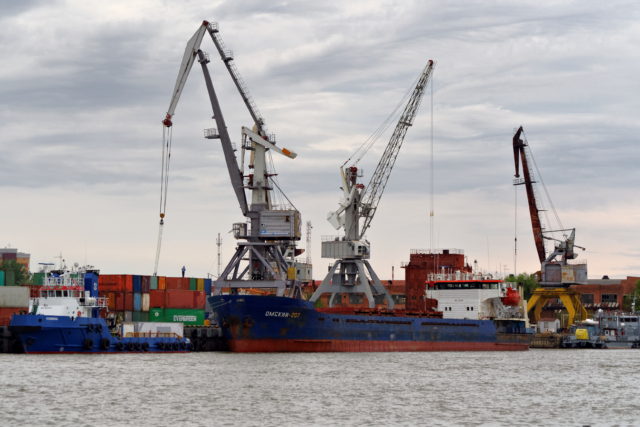
Collapse of Russian Shipping in the Caspian Puts Moscow’s Regional Strategy at Risk
Publication: Eurasia Daily Monitor Volume: 14 Issue: 70
By:

Since the start of 2017, the amount of cargo passing through Russian ports on the Caspian Sea has fallen, compared to last year, by 48.4 percent to only 1.1 million tons, according to the Russian Ports Association. This figure is striking given that Russian ports elsewhere have seen an 11 percent increase in traffic over the same period, while the ports of other Caspian littoral states have also grown busier. Such trends are worrisome to Moscow because the decline in traffic at Russia’s Caspian ports is accelerating and putting the country’s regional geopolitical strategy at risk (Eadaily.com, May 19).
The Russian port in Makhachkala, the capital of Dagestan, has been especially hard hit; as of January, shipments to and from this port have fallen by 73.7 percent to 316.7 tons, largely because of problems with the supply of oil. Experts say the shipped oil contains too much water to be used effectively. But another problem has been the multiple conflicts among business owners in the region that neither Moscow nor the Dagestani authorities have been able to resolve (Riadagestan.ru, April 26).
Similar issues have hit Russia’s Caspian ports in Astrakhan, where shipments have fallen 17.6 percent in the first quarter of 2017, as well as at Olya, on the Volga delta, where they have fallen 19 percent. The decline suffered by the Olya port is especially concerning for authorities in Moscow because the Russian government has repeatedly asserted that this coastal city is to become a key hub for both the North–South and East–West inter-regional transit corridors. But despite bold words and massive investment, the Russian Federation has less to show for this project than it had before it began the spending. The money has simply disappeared into private hands (Eadaily.com, May 19).
If all the ports on the Caspian were suffering declines, one might write off such a phenomenon to the overall economic situation; but that is not the case. Azerbaijani ports on the sea, for example, rose by 26.1 percent in the first quarter of 2017 compared to a year ago; and ports in Kazakhstan, Turkmenistan and Iran saw increases, albeit smaller ones, as well. And one cannot explain the Russian declines by the Western sanctions regime: sanctions do not apply to the shipping limited to the Caspian littoral, nor have they limited the growth of cargo traffic at other Russian ports elsewhere (Eadaily.com, May 19).
What then is going on? The answer can be found in the complicated politics of the Caspian region, the continuing difficulties the littoral states have in demarcating the seabed, as well as growing tensions among some of these states with Russia. And because that is the case, the decline of freight traffic at Russia’s Caspian ports in the first quarter of 2017 is even more significant than might appear at first glance.
In Soviet times, Moscow and Tehran divided the Caspian into two unequal zones, a division that even then had important implications because of the oil and natural gas reserves discovered on the seafloor as well as due to the rising trade between the Soviet Union and Iran. With the disintegration of the Soviet Union, the number of littoral states increased from two to five: Azerbaijan, Kazakhstan and Turkmenistan thus become involved in talks about delimitation and trade on the Caspian alongside the Russian Federation and Iran.
For 25 years, these five littoral states have been unable to reach an agreement on the division of the seabed, something Moscow has exploited to block many pipeline projects that would not have involved Russia. Yet, at the same time, that deadlock has led to expanded contacts between other pairs of littoral states and increased shipping between and among them—again to the exclusion of the Russian Federation (Abo.net, April 18, 2016; Natural Gas World, May 6, 2017). Now, Moscow’s policies have returned like a boomerang to limit its future role in the region.
Russia, Azerbaijan and Kazakhstan call for treating the Caspian as a lake rather than an ocean, an arrangement that would divide the seabed among the countries but leave surface commerce open to all. Whereas, Turkmenistan and Iran want it to be treated as a sea and be divided totally into five sectors. Despite suggestions at a January 2017 ministerial in Baku that the five Caspian littoral states would sign an agreement overcoming the divergence of positions (see EDM, May 8), the participating foreign ministers could not even say when such a meeting would occur this year, an indication that they remain far apart (Mfa.gov.az, Azernews.az, January 25).
Indeed, tensions between these countries and Moscow are on the rise, and the changed shipping patterns in the Caspian are undoubtedly a reflection of that as well. Azerbaijan, for example, has been so outraged by Moscow’s decision to ban the All-Russian Azerbaijani Congress, which unites a million ethnic Azerbaijanis in Russia (see EDM, May 22), that there have been reports Baku might even consider inviting Turkey to set up a military base in Azerbaijan (Golosislama.com, May 16).
Any such radical move is unlikely, but the non-Russian littoral states are clearly exasperated with Moscow for repeatedly blocking their energy projects and other goals. As a result, they are now using their own economic leverage—changing the flow and carriers of goods—a language that Moscow will certainly understand.



